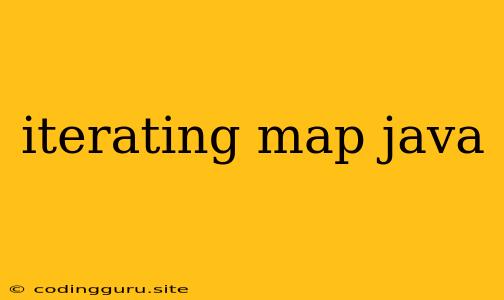Iterating Over Maps in Java: A Comprehensive Guide
Java Maps are powerful data structures that store key-value pairs. However, navigating and accessing these pairs efficiently can be challenging. This guide will explore various methods for iterating over maps in Java, providing you with the tools and knowledge to confidently manipulate these data structures.
Why Iterate Over Maps?
Iterating over maps is essential for several common tasks, including:
- Data Processing: Accessing and modifying key-value pairs for calculations, transformations, or analysis.
- Searching: Finding specific keys or values within the map.
- Filtering: Extracting relevant entries based on certain criteria.
- Displaying Data: Presenting map contents in a clear and organized format.
Methods for Iterating Over Maps
Java provides several ways to iterate over maps, each with its own advantages and considerations. Let's delve into the most popular approaches:
1. Using the entrySet() Method
The entrySet() method returns a Set of Map.Entry objects. Each Map.Entry represents a key-value pair. This approach is the most common and versatile method for iterating over maps.
Map map = new HashMap<>();
map.put("Apple", 1);
map.put("Banana", 2);
map.put("Orange", 3);
for (Map.Entry entry : map.entrySet()) {
System.out.println("Key: " + entry.getKey() + ", Value: " + entry.getValue());
}
2. Using the keySet() Method
The keySet() method returns a Set containing all the keys in the map. You can iterate over this set and use the get(key) method to retrieve the corresponding value.
Map map = new HashMap<>();
map.put("Apple", 1);
map.put("Banana", 2);
map.put("Orange", 3);
for (String key : map.keySet()) {
System.out.println("Key: " + key + ", Value: " + map.get(key));
}
3. Using the values() Method
The values() method returns a Collection containing all the values in the map. This approach is useful when you only need to work with the values.
Map map = new HashMap<>();
map.put("Apple", 1);
map.put("Banana", 2);
map.put("Orange", 3);
for (Integer value : map.values()) {
System.out.println("Value: " + value);
}
4. Using the forEach() Method with Lambda Expressions
Java 8 introduced lambda expressions, which provide a concise way to iterate over maps. The forEach() method accepts a lambda expression that defines the action to be performed on each entry.
Map map = new HashMap<>();
map.put("Apple", 1);
map.put("Banana", 2);
map.put("Orange", 3);
map.forEach((key, value) -> System.out.println("Key: " + key + ", Value: " + value));
5. Using the Iterator Interface
The Iterator interface provides a more manual approach to iterating over maps. It allows you to explicitly control the iteration process.
Map map = new HashMap<>();
map.put("Apple", 1);
map.put("Banana", 2);
map.put("Orange", 3);
Iterator> iterator = map.entrySet().iterator();
while (iterator.hasNext()) {
Map.Entry entry = iterator.next();
System.out.println("Key: " + entry.getKey() + ", Value: " + entry.getValue());
}
Tips for Efficient Iteration
- Choose the Right Method: Select the most appropriate method based on your specific needs.
- Avoid Modifying the Map During Iteration: Modifying the map while iterating over it can lead to unexpected behavior. If necessary, create a copy of the map or use a different approach for modification.
- Consider Performance: For large maps, the
forEach()method with lambda expressions can be more efficient than traditional loops. - Use the
Map.EntryInterface: When accessing key-value pairs, use theMap.Entryinterface for easy access to both the key and the value.
Conclusion
Iterating over maps in Java is a fundamental operation. Understanding different iteration methods and their advantages empowers you to efficiently process, analyze, and manipulate map data. Choose the method that best suits your needs and leverage the power of Java maps effectively.
